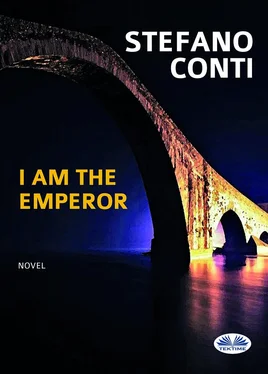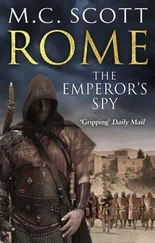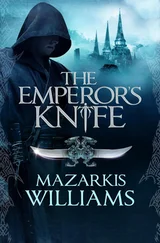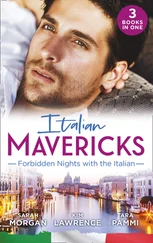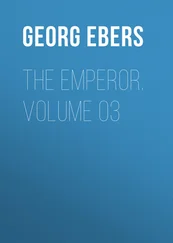«And that up there, what is it? A tomb?» I ask.
«Yes, he took pictures there. Very important: he found rock with writing on, when it happened» translates Fatih.
Panting I get up the small hill, followed by the other two. I see, crumbled to the floor, what could be the ruins of a funeral building. I cannot see though the epigraph that was supposed to be at the entrance. Only the engraved stone, found by the professor last week (about which he told me via email), could confirm that here lies Julian.
«What about the material you found here?» I ask with fake nonchalance.
«For short time still in the hangar where we were, then comes government officer and takes away everything» Fatih tells me in his uncertain Italian.
I must accelerate.
«I should go to the toilet» I say touching my stomach.
«Only in the warehouse.»
«I know the way, you can stay here, thank you.»
I run to the warehouse and start looking frantically among a pile of crates: I try to move some, they’re heavy. On each one there is a note written with a fading blue marker: these should indicate time and digging sector of the findings.
Which day was it when the professor told me about finding the tomb? I check the crate from 9 July: only pieces of plaster and common pottery. Of course: the discovery must be from the day before, since he sent me the email on the morning of the 9 and died that same evening.
I pull out the crate from 8 July and, I can’t believe it, I find the epigraph!
A marmorean fragment, less than one meter long, with Greeks carvings: I’m in a hurry, but it is hard to understand the letters badly preserved; I take some quick pictures with my inseparable Nikon.
With a flimsy paper that was left on a table and a pencil I improvise a tracing: it is a rudimentary but very efficient technique, learnt during my master in Germany. Rubbing the pencil on the paper put against the epigraph, the holes of the engraved letters leave a blank: all the paper looks grey, apart from the spaces left blank, outlining the shape of the letters.
I’ve lost too much time, I run back to the gloomy cliff: «Sorry… probably the curves of the trip or maybe the violent tale of the professor’s death… well I felt unwell, but I’m better now. So, is the professor here?»
The two look at me confused.
«Well, the corpse: can I take it? I am in charge of taking it back to Italy and…»
«No. It is in the public obituary. I know where it is, I can take there if wants» offers kindly Fatih.
We thank the assistant, who keeps looking at us while going away.
We get back on the moped.
«Gülek Boğazi» screams Fatih short after our departure.
Between the noise of the moped and my fear I can’t understand a thing.
«Gülek Boğazi» he insists, pointing at a canyon among the mountains.
I look down and I understand: it is the “Cilician Gates”, the only passage since ancient times from internal Anatoly and the coast. Crossed by Alexander the Great: a role leader for many, including Julian.
«Gülek Boğazi» I repeat, while the precipice makes me hang even tighter to the driver.
Going down is, as usual, worse than going up: the moped’s breaks seem out of control and at each bend, instead of admiring the landscape, I think about the possibility of falling when right before the cliff it turns and we proceed.
When we arrive at Tarsus’ hospital I am so pale, that they almost take me in as a patient. Fatih asks information to a nurse passing by: I follow my adventure mate, dragging my feet in the long underground corridors until we reach a big ice-cold room.
The anatomopathologist almost invisibly turns up his hooked nose when I show my embassy document. He still lets me sign a series of papers, probably looking forward to getting rid of the corpse. He gets up, gives me two copies of the medical report, then shakes my hand, my arm and then my hand again. Weird way of greeting.
«These documents you give to customs to take body to Italy» translates Fatih, then he adds: «Coffin is outside in the car and with that you go back in Ankara».
I thank him for the translation and all the help, hugging him: I got used to it due to the moped; I try to slip 100 euros in his pocket.
The engineer gets offended: «No… my pleasure, say hi to Chiara, no better, tell her she calls me if she wants. I don’t disturb, but if she… this my number».
«I really don’t know how to thank you, for everything. Greetings to your… mother, as well.»
Outside I find an ambulance: I guess the corpse is in there. I almost got in, when two highly suspicious and huge guys come closer. I try to get away. They follow me and, saying incomprehensible things, push me in front of a shabby white pickup: that’s the designated means of transportation. In open backside I can see the coffin. The two bullies, literally lifting me up, put me there, next to it, while they sit in the front.
The horrible trip of the night before was a joke compared to this one: that one was full of smokers and I had to put my head out, here I am out completely alone with a dead body as company! The coffin, roughly tide with small laces, seems to be jumping out at every hole; I remain holed up on the opposite side: I don’t dare approaching it. I have an absurd fear of finding myself face to face with the corpse: after I left, reluctantly, my job at the University, I never wanted to see again the professor alive, imagine once dead!
I think about the day that’s passed and the one that awaits: the only thought of going back to customs gives me goosebumps, but the task I was assigned from the Literature faculty director is to get back the corpse to Italy. I repeat this mantra to charge myself up along the way, while the wind hits me harsh on the face.
Sunday 18 July
It is around 3 in the morning when the van stops. I’m afraid they want to leave me there, in the middle of nothing.
The two get off and talk to me in an unknown language. The smallest, or to better say the least big, repeats the same sentence doing wide movements with his hands: I understand I have to get off. I follow them until a crumbling shack: it is some sort of motorway restaurant, half family half down at heel business. I run to the toilet. That’s what they call Turkish toilets: a filthy stinking loo without the WC.
Then I enter what, euphemistically speaking, should be the bar: a fatty lady is preparing a weird drink, while the two travel companions are sitting at a table smoking and drinking a huge beer. I take the chance to have breakfast, trying to avoid thinking about the driver drinking in the early morning. I slowly sip the umpteenth boiling long coffee, accompanied by a focaccia stuffed with an odd-coloured salami: it’s not the best taste, but I’m very hungry having skipped dinner due to the sudden departure from Tarsus.
It takes at least half an hour before the two finish another beer and decide to get back on the van. The less drunk offers me an old blanket: the air was hot when we left, now it is that biting one of the early hours of the day. It is the first kind act towards me: left alone in the backside of the van I felt like a spare wheel.
At sunrise we arrive in Ankara; I’m still stunned by the wind and the road, when they heavily unload the coffin from the van, giving it to a group of custom officers. Lieutenant Karim orders me to leave it there and go back the following day to pick it up with the embassy documents: I really don’t like this guy! I thank the two carriers with a lavish tip, that they do not refuse, while I say goodbye to Barbarino, who lays now in a sort of garage in the custom’s undergrounds.
I am exhausted. In front of the airport several hotels shine in the light of the beginning day. I choose the only one with four stars in its panel: Esenboga Airport Hotel . I don’t care if it’s expensive: the University director promised me to refund all expenses if I had taken our eminent colleague back to the mother land.
Читать дальше
